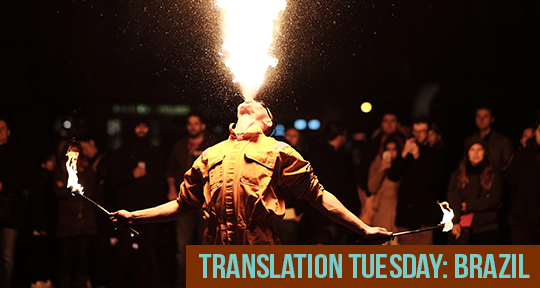This Translation Tuesday, dive into a short story from Jabuti Prize-winning author Nei Lopes that takes the reader a century back to Guanabara Bay in Brazil where a circus troupe disembarks. Drawn from a short story collection (Nas águas desta baía há muito tempo: Contos da Guanabara) that zooms in on complex and forgotten chapters in Brazilian history. Hear from translator Robert Smith how Lopes, in Smith’s own words, “undertook meticulous historical research to offer a sweeping view of the place and era, celebrating Afro-Brazilian culture and exploring the history of systemic racism.”
“In portraying a dynamic period of upheaval, the narrator Prodigy occasionally overwhelms readers with the feeling that too much is happening too fast. At the same pace that his story becomes entangled with that of the geographical region, two revolts, and the historical figure João Cândido Felisberto, his ebullient mood overlaps episodes of horrific violence. This translation took some liberties in altering punctuation to maintain this disorienting effect. When translating idiomatic expressions indicative of a past era, I looked to rough English equivalents that would sound similarly dated to contemporary readers. A challenge specific to this short story is the multivocal narrative, which leaves the question open as to whether we are facing a carnival storyteller who is cordially inviting us to suspend disbelief, a folktale with elements of magical realism, or an unreliable narrator whose traumatic experiences as a victim of abuse and a soldier have led him to rewrite his life story.”
—Robert Smith
This island has a lot of stories. They all do, I should say; the whole bay: land and sea. The day the first circus arrived, for example, was like the world was starting all over again.
When the barge docked and started unloading all that stuff, we had no idea what it might be. But a strange joy took hold of everybody, made us want to sing and dance to do something to please that gift that had fallen from the sky without saying what they had come for. Little by little, the colorful poles, the boards, the wheels, the iron braces, the motley flags appeared… Then the cages with the animals.
It was the Seventh of September¹, and, while we were watching everything in awe, the fireworks were going off. The ships, Tamandaré, Trajano, Liberdade², were sailing by in the bay, shooting their fireworks toward the city, way over on the other side. Right then and there, we knew that something truly beautiful had begun in all of our lives.
Disembarking in the quay, the caravan of oxcarts and wagons continued down the bumpy old road. The company was directed by the famous artist Benedito de Lima. And it arrived on our island, straight from Niterói, to save us from our isolation and change our daily routine. It popped up out of nowhere, the only attraction in our village, stirring up the hopes and daydreams of rich and poor, young and old, black and white; everybody.
No one had known the circus was going to come. But when it arrived, even without announcements or pamphlets or newspapers, word got round. READ MORE…

